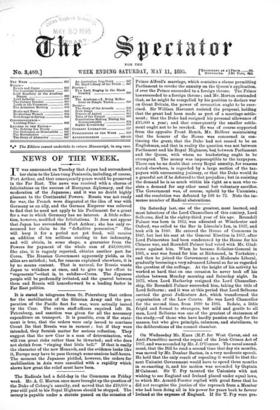On Wednesday Mr. Knox (M.P. for West Cavan, and an
Anti-Parnellite) moved the repeal of the Irish Crimes Act of 1887, and was seconded by Mr. J. O'Connor. The usual amend- ment, that the Bill be read a second time that day six months, was moved by Mr. Dunbar Barton, in a very moderate speech. He held that the only result of repealing it would be that the next Unionist Government would have to spend three months in re-enacting it, and his motion was seconded by Qaptain M'Calmont. Sir T. Fry taunted the Unionists with not wishing to see England and Ireland placed under equal laws, to which Mr. Arnold-Forster replied with great force that he did not recognise the justice of the reproach from a Member who had been doing all in his power for years back to favour Ireland at the expense of England. If Sir T. Fry were pre- pared to extend the Land-laws, the Poor-laws, and the Educa- tion laws of Ireland to England, there would be some meaning in his complaint. Mr. John Morley made a strong speech in favour of the repeal of the Crimes Act, which made it almost a Government measure, and he actually approved of referring it, if it passed its second reading, to the Grand Committee on Law, where its provisions could not possibly be impartially canvassed as the whole House would wish to canvass them. Mr. Balfour replied that at least Mr. Morley was doing his best to teach them how to re-enact the Act, if it were repealed, with the least possible expenditure of time. They would only have to pass it again ; to cut short the discussion on the second reading by the guillotine; and then to get through the Committee stage in a Grand Committee intended only for non-contentious measures. The Closure, moved for the second time (after the Speaker had once disallowed it), was carried by a majority of 17 (225 to 208), and the second reading itself by a majority of only 14 (222 to 20S), and it was found afterwards that one Unionist who had voted had not been counted, so that the real majority was only 13, though the Parnellites and Anti-Parnellites were united in favour of the Bill. The proposal to refer the Bill to the Grand Com- mittee on Law was not discussed but adjourned.







































 Previous page
Previous page